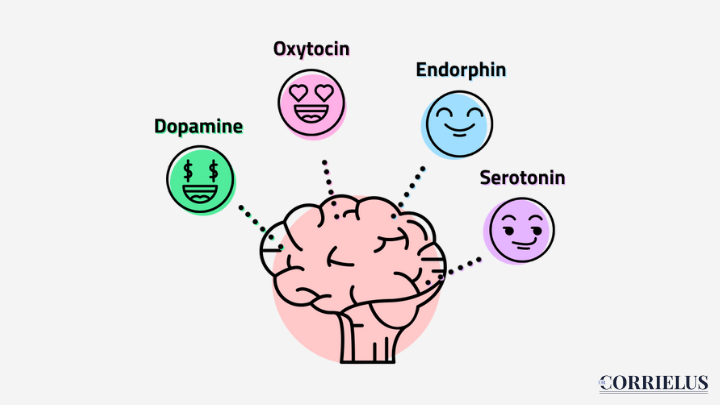The hormones present in our body play a specific role. They can affect our mood. This refers to a selected group of hormones that control your well-being.
Farvah Fatima, M.D., a family medicine specialist at Henry Ford Health said that some different hormones and neurotransmitters help us feel better. And there are many ways to induce the release of these hormones. Simple activities such as exercising, spending time outdoors, and snuggling up with a puppy (or person) are all useful.
Read the full article to learn more about these hormones and how to utilize them.
What are happy hormones?
Various glands present in the body produce chemical substances called hormones. One of the most important roles of these hormones? Helping regulate your mood.
Certain hormones are known to help promote positive feelings, including happiness and pleasure. These “happy hormones” include:
Dopamine:
Also called the “feel-good” hormone, dopamine is a neurotransmitter that plays an important part in the brain’s reward system. Dopamine helps regulate pleasure, as well as learning, memory, and motor function.
Serotonin:
Serotonin is considered a neurotransmitter that the body uses to send messages between nerve cells. It also helps regulate your mood as well as your sleep, appetite, digestion, learning ability, and memory.
Oxytocin:
Oxytocin, often referred to as the “hormone of love,” is essential for childbirth, breastfeeding, and strong parent-child ties. This hormone also helps promote trust, empathy, and bonds in relationships. Oxytocin levels generally rise with physical affection.
Endorphins:
Endorphins are the natural painkillers for your body, and your body produces them in response to stress and discomfort. Endorphin levels also tend to increase when engaging in rewarding activities such as eating and exercising.
Ways to increase your happy hormones
Exercise
Exercise releases endorphins. Exercises that increase your heart rate can create positive feelings, and a vigorous, pulse-raising workout can cause an exercise-induced euphoria. Endorphins also interact with pain receptors in the brain and reduce the perception of pain.
Massage
Massages and all sorts of soothing touches can stimulate the release of endorphins and stimulate the production of oxytocin for both the person. This also applies to other healing therapies that relax the body and relieve pain (acupuncture, chiropractic, hydrotherapy, etc.).
Laughter
Keep an eye on your favorite comedy show and increase your endorphins!
Laughter reduces stress, improves immune function, and generally raises the mood. Laughter therapy is effective enough to establish itself as cognitive-behavioral therapy for treating stress and depression in patients.
Listening To Music
Singing and listening to music releases oxytocin. Jazz singers have been shown to improvise and release high levels of oxytocin by interacting with the band. Meanwhile, another study showed that patients who went through cardiotomy recovered faster after listening to relaxing music regularly.
Essential Oils
The olfactory system of your body responds to the scent of essential oils such as bergamot, lavender, and lemon, releasing serotonin and dopamine into the brain. This is why aromatherapy is popular among people suffering from stress, anxiety, depression, and other mood disorders.
Recalling Happy Memories
The mood and memory in the brain interact at a point, when combined with the part of the brain associated with attention, it can cause the production of serotonin. This can happen when you’re thinking of vibrant and happy memories, or when you’re looking at a fun family vacation or wedding anniversary photo.
A word from the doctor —
If you’re worried that your bad mood is related to hormones and need help, don’t hesitate to reach out.
Contact me right away, if you have any other questions related to mental health.



